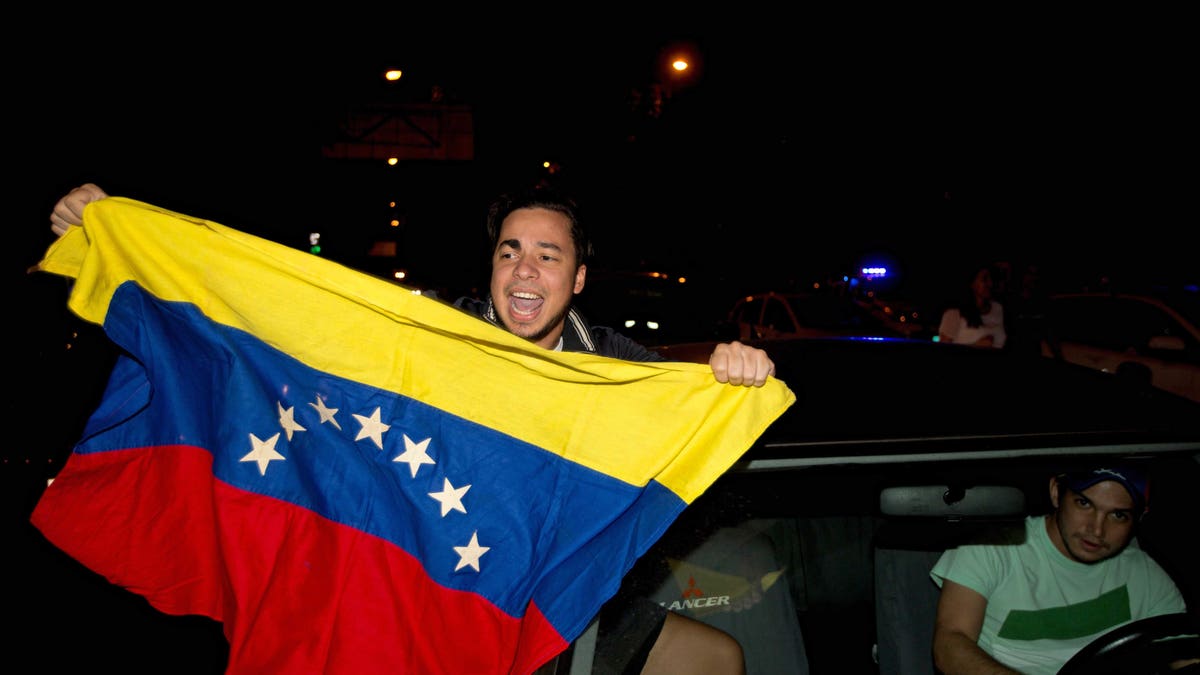
Opposition supporters celebrate in Caracas, Venezuela, early Monday Dec. 7, 2015. Venezuela's opposition won control of the National Assembly by a landslide on Sunday, delivering a major setback to the ruling party and altering the balance of power after 17 years of socialist rule.(AP Photo/Fernando Llano) (ap)
The political earthquake in Argentina had a replica in Venezuela on Sunday.
The opposition coalition, Mesa de Unidad Democratica (MUD-Unidad), won both the raw popular vote and a supermajority of two-thirds in the National Assembly.
The excuses of "economic war" and conspiracies did not work. The people held the government of Nicolas Maduro and his party accountable for the deep economic crisis in which Venezuelans see themselves immerse after decades of oil bonanza — a fact that renders the suffering unexplainable.
The challenge and responsibility on the shoulders of the emerging leaders on both sides of the political spectrum, after the parliamentary elections in Venezuela, is to start a new chapter in the country's history.
Neither the intimidation to government employees and social programs beneficiaries, nor the persecution of key leaders held as political prisoners or the menace of political violence – at its worse with the brutal assassination of Luis Manuel Diaz, a regional opposition leader a week before the elections – could stop the people from turning out to vote and demand change.
The doubts hovering over a pacific, electoral and constitutional path to resolve the crisis and rebuild democracy in Venezuela, after years of neo-authoritarian populist rule, have been dissipated.
Leaders as Henrique Capriles and other in MUD-Unidad had insisted without hesitation, despite of the critics and cynicism, that it was possible. They were right, and this is probably the most important political impact of Sunday's electoral result.
Chavismo without Chavez is no longer wrapped in an “aura of invincibility.” Fears and doubts are now defeated by facts, and this empowers citizens and the political alternative to the regime in a way that will show more results as the country walks into governor races in 2016, municipal elections in 2017, and presidential elections in 2018.
And here come the bigger questions: Will the government embrace changes and get the message, or will it continue this self-destructive strategy of radicalization? Can the country wait if electoral results don't translate into actual changes in people’s day-to-day economic nightmares? And will the opposition escalate from this result to a referendum that would call for a new presidential election altogether?
The new parliamentary majority held by MUD-Unidad cannot be used as a “political bat.” It would be a grave error to not embrace tolerance, especially since one of the big challenges for the new Assembly will be to enact an Amnesty Law that puts an end to persecution for the polarizing events of the past 15 years, and therefore release political prisoners such as Leopoldo Lopez.
Amnesty does not imply impunity, but the reestablishment of an independent judiciary that can provide fair trials, under due process, to the many corruption cases that surround the current government elite. In the political and social front though, a social dialogue must promote amnesty and reconciliation.
The ruling Chavista elite did not realize that while the economic crisis accelerated discontent, it also took their credibility to provide excuses or place blame on others, such as the private sector. The people of Venezuela held them accountable for their neglect to address credible and efficient economic reforms, but also for lying recklessly about why this was crisis was actually taking place. The narrative of the “economic war or conspiracy” became offensive.
Now a national agreement continues to be necessary and the new majority in the National Assembly must engage in providing the people who elected them, in good measure as a punishment vote to the incumbents, with a path to economic recovery and reform.
The democratic leadership must prevent the Assembly to be reduced to a sterile field for political conflict, unable to influence in the management of a crisis that will worsen in 2016, both in economic terms and in social terms.
The objectives of political amnesty, reconciliation without impunity, as well as a national agreement to re-launch the economy through investment and production are priorities to address the crisis wisely.
There is the potential for a conflict of powers between the executive branch and the packed Constitutional chamber of the Supreme Court, and soon to be former Assembly Speaker Diosdado Cabello has been clear that such a conflict is coming. Thus, the only way to challenge that contention is by unfolding a comprehensive proposal to cure the nation with a narrative and actions aimed at the people who expect much more from their institutions.
In such efforts, one strategic question is how to persuade some sectors of the Chavista ruling elite, not necessarily visible but those whose voices are silenced by the leadership, that their time has come.
In fact, Nicolas Maduro’s negative ratings are beginning to have an impact over the “positive image of Chavez." A set of recent polling data by Keller and Associates, which predicted the outcome of Sunday’s election, confirms that fact.
At first, amid the decline in popular support for Maduro, Chavez's image remained intact over 65 percent on average, with a peak in 2014 at 68 percent. It is no longer the case. Only in 2015 Maduro went from 33 percent to almost 18 percent, and now he dragged his "political father" positive memory to 49 percent.
Venezuela’s 6D parliamentary elections outcome should be interpreted by all as an opportunity to take a turn towards democracy ... or else enter a worse, much worse stage than that experienced in recent years.
The challenge and responsibility on the shoulders of the emerging leaders on both sides of the political spectrum, after the parliamentary elections in Venezuela, is to start a new chapter in the country's history.
Hopefully, if common sense prevails, it will be a better one.
